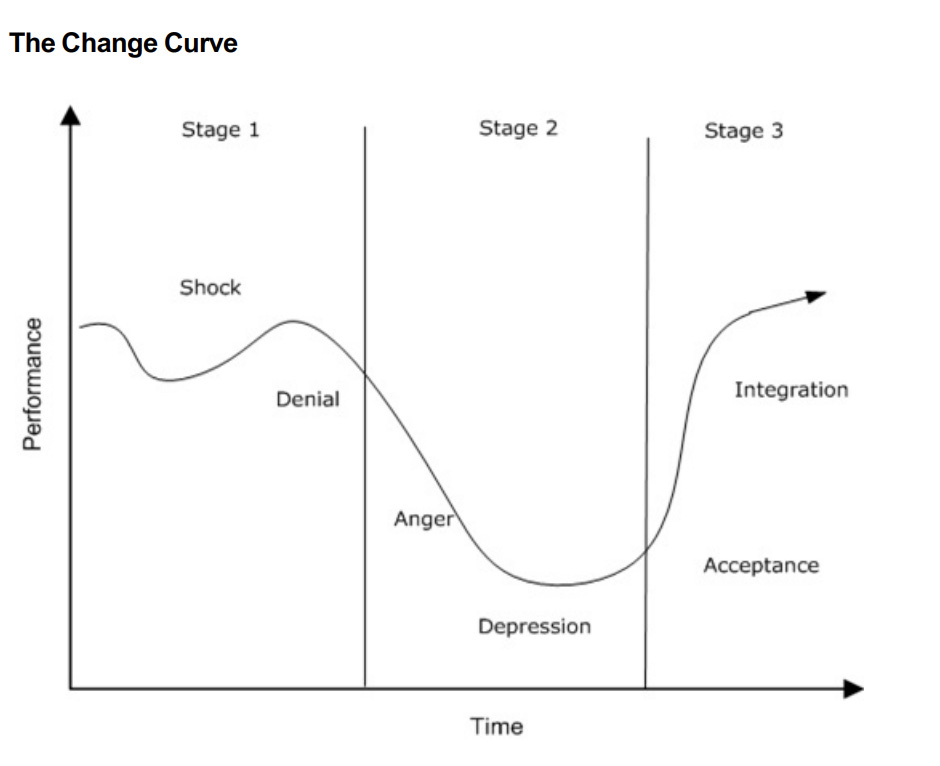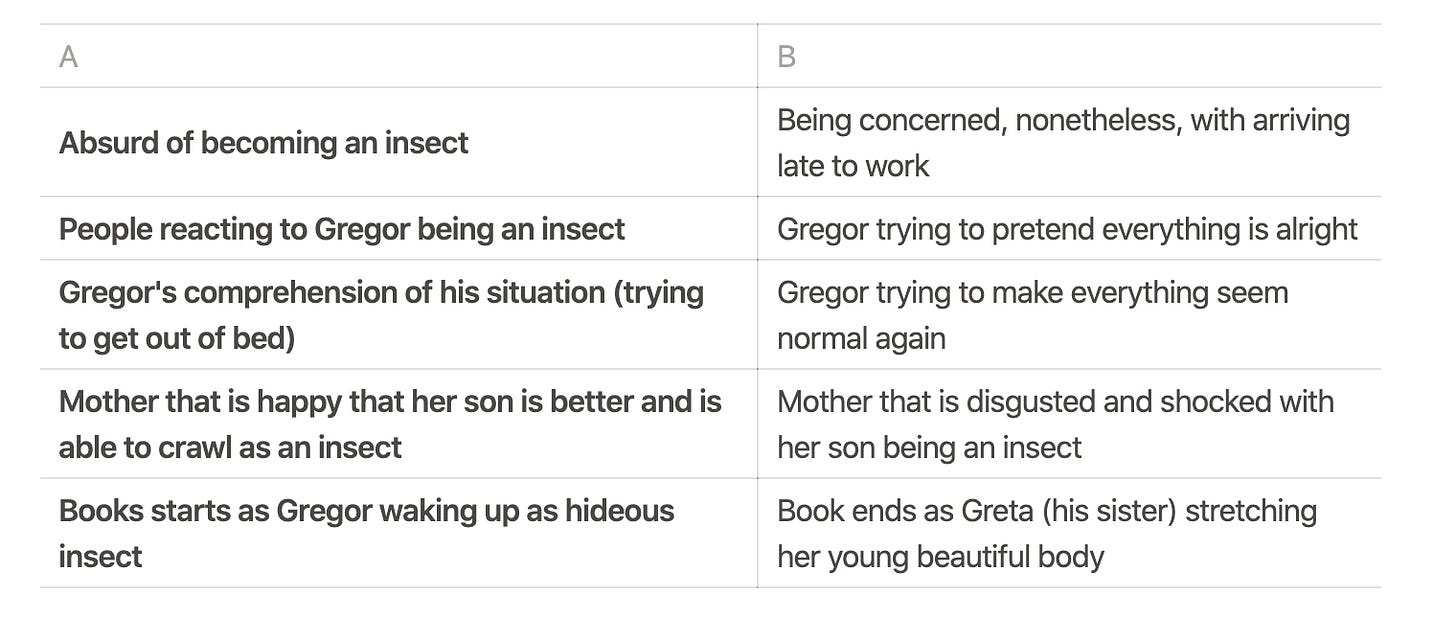#003: Metamorphosis by Franz Kafka
A fiction master piece that takes a weekend to read but a lifetime to digest
TLDR
Summary: Metamorphosis is a classic fiction work depicting the absurd of becoming an insect. Some regard it as the greatest short story in all literary fiction.
Why read it: Easy to read, short but packs a punch. If you're looking to read a masterpiece from one of the major figures of 20th-century literature that will leave space for your interpretation, it's a great return on investment.
What you get from it: It's up to you. The interpretation of the tale is up to the reader. I take some conclusions out of the tale but those are mine.
Rating:
Timeless? ✅>100 years old
How big is the book? Small: you can read it in a day or in a weekend
Return on investment of reading? ✅
All in all: ⭐️⭐️⭐️⭐️⭐️(5/5)
Should you read it? Yes.
Before we start:
I’m reading 100 books like this one and will be sending you summaries so you can decide if you want to read it yourself. If this is interesting, consider subscribing below
The book
The Metamorphosis
By Franz Kafka - Translation by Susan Bernofsky (Why I chose this translation: 1,2)

First: a note to my reader
This is my first fiction book that I include in this newsletter. Which leads me to say: I can summarize this book as much as I can enjoy a painting for you. I don't find it possible.
As Seneca wrote in his Letters from a Stoic:
So give up this hope of being able to get an idea of the genius of the greatest figures by so cursory an approach. You have to examine and consider it as a whole. There is a sequence about the creative process, and a work of genius is a synthesis of its individual features from which nothing can be subtracted without disaster.
(This is connected to what modern philosophers call the Hermeneutic circle: understanding a text as a whole depends on understanding the parts and vice versa).
So while I can't summarize it I can, however, motivate you to go look at it yourself. This article shows a few ideas that I found fascinating that don't replace nor take away from reading the book.
The story in simple terms
The book can be summarized in 3 bullet points:
A sales person, Gregor Samsa, wakes up as an insect
Gregor's family, boss and other tenants of the house are horrified by his presence making him feel like a burden
Gregor dies leaving his family ultimately free to move on
Franz Kafka left the interpretation of much of this book to the reader. So each person will get something different from it. As an example: nowhere in the book is the specie of insect referred. Maybe this is for us readers to contribute to the tale with our own fears and definition of disgusting.
Below is my interpretation. If this was a book club, I'd invite you to read it yourself and debate these ideas.
Sudden change
This book seems to be an allegory to change and aging. About the change that's imposed on us in life. Sudden, abrupt, horrible, unexpected change leading to a shock. You wake up one day and things are nothing like you'd like them to be. What is sudden may have been building up over time, but you're not cognizant of that.
Our perception of time is non linear, in which it feels like you got old all of a sudden. We're not aware of small incremental change. Getting old creeps up on you. Like Gregor, he wakes up as an insect one day, sudden and final without any prior realization of symptoms. Like the Pink Floyd song, Time:
Tired of lying in the sunshine staying home to watch the rain.
You are young and life is long and there is time to kill today.
And then one day you find ten years have got behind you.
No one told you when to run, you missed the starting gun.
Kafka compares looking at Gregor as like looking at a gravely ill patient or stranger. This comparison is probably not innocent.
Gregor is launched into a Change Curve, on which he is a passenger without any means of communicating and at the mercy of his family.

Denial
Just after sudden and abrupt change and Shock, comes denial. Throughout the book comes many evidences of denial not only from Gregor but also from his family.
Although now an insect, Gregor still tries to focus on trying to get to his job on time, an absurd thought given his sudden condition. Instead, he needs to think about the consequences of not being human and re-learning how to eat. But unfortunately, he's not there yet as he hasn't accepted what has happened to him.
This is also an absurd situation to exemplify the need to rebase our attention to our needs. Denial hinders us from understanding what we really should be looking to focus on or improve.

In his family, there are also examples of denial. Like Gregor's mother not wanting to change his room and remove furniture as it would make his transformation final.
But, after denial, there are also moments of acceptance. About coming to terms with who you are. Like Gregor felling good about the first time he crawled with his little legs or wanting to have his room transformed like a cave.
Loneliness and humanity
It strikes me how lonely Gregor feels. Locked away in his room, without anything other than his thoughts, without a way to communicate to people. To be thought as something so vile that makes his own mother's skin crawl.
Gregor's own humanity is taken from him gradually. After the shock, his family turns away from him, forgetting slowly about him as a man and accepting him as a nuisance and burden. His sister went from bringing him food to feeling free after his death. The intolerance for Gregor grows while his hope to live diminishes.
In the final part of the book, all of Gregor's humanity is removed out of him and he dies ultimately freeing his family.
Contradictions
I find that the book is also about exploring different contrasts. A few examples below:

Three sentences on Kafka
Some people think that Kafka wrote this novel about himself. That he felt like Gregor.
Kafka considers his novel as unfinished given he was not happy with how it ended
One of my favorite quotes from Kafka:
I am a cage in search of a bird

